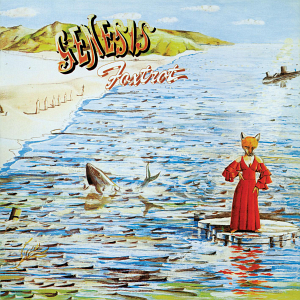
Foxtrot (album)
Foxtrot is the fourth studio album by the English progressive rock band Genesis, released on 15 September 1972 on Charisma Records.[1] It features their longest recorded song, the 23-minute track "Supper's Ready".
Foxtrot
The album was recorded following the tour in support of their previous album, Nursery Cryme (1971), which saw them gain popularity, including a well-received slot at the Great Western Express Festival, Lincolnshire in May 1972. The album was written over the summer of 1972 and combined songs that had already been performed live with new material worked out in jam sessions. Recording began in August with John Anthony, but sessions were prone to tension and disagreements. After a short Italian tour, sessions resumed with Dave Hitchcock as producer. The cover was the final Genesis work to be designed by Paul Whitehead, featuring a fox wearing a red dress. Frontman Peter Gabriel wore the dress and a fox's head on stage for the following tour, which gathered press attention and raised the group's profile.
Foxtrot was the first Genesis album to chart in the UK, reaching No. 12, and received largely positive reviews. It went to number one in Italy. A non-album single "Happy the Man" was released at the same time. The album has continued to attract critical praise and was reissued with a new stereo and 5.1 surround sound mix as part of their 2008 Genesis 1970–1975 box set.
Background[edit]
By the end of 1971, Genesis consisted of frontman and singer Peter Gabriel, keyboardist Tony Banks, bassist and guitarist Mike Rutherford, guitarist Steve Hackett and drummer Phil Collins. They had played around 400 gigs in the UK, but had yet to achieve commercial success. However, they had begun to become popular abroad; their 1970 album Trespass had reached No. 1 in Belgium, while 1971's Nursery Cryme had reached No. 4 in Italy. The Italian leg of the tour in April saw Genesis play to large and enthusiastic crowds, which gave the band a new sense of their audience appeal.[4]
The tour concluded in May that saw Genesis perform a set at the Great Western Festival in Lincoln.[5] Gabriel appeared wearing a jewelled Egyptian collar, black eye makeup, and had shaved the front of his head, which drew attention from the press.[6] Upon returning home the group dedicated time to write and rehearse new material for a new studio album.[5] Hackett considered leaving the band after feeling "fairly shattered" from the lengthy tour, but his bandmates persuaded him to stay.[7]
Production[edit]
Recording[edit]
Initial rehearsals were held in a rehearsal space at Blackheath in London before they relocated underneath the Una Billings School of Dance in Shepherd's Bush.[5][6] Some material Hackett used for his first solo album, Voyage of the Acolyte, was rehearsed by Genesis during the Foxtrot sessions but not used on the album.[8] Material that became "Watcher of the Skies" and "Can-Utility and the Coastliners" was performed live before recording of Foxtrot started.[6][9]
Genesis recorded Foxtrot in August and September 1972 in London at Island Studios.[2] They were set to record with producer John Anthony, who had worked with them on their new song "Happy the Man" earlier in the year, but escalating costs due to the slow progress of completing it caused disagreements among Anthony and Charisma Records, the group's label, so they looked for a new producer.[10] Banks recalled Charisma were anxious for the group to make a hit recording. The group's first choice for producer was Bob Potter, who had worked with Charisma labelmates Lindisfarne with Bob Johnston engineering.[9] The band did not get on with Potter as he disliked their music; he compared Banks's Mellotron opening to "Watcher of the Skies" to the soundtrack to the science fiction film 2001: A Space Odyssey and felt the song was better without it.[5][9] The band curtailed these unproductive sessions and toured in Italy in August 1972 before resuming work on the album the following month.[9] The group tried out Tony Platt as a producer, but this was abandoned owing to personality clashes.[11] Genesis then settled with co-producer Dave Hitchcock and John Burns as engineer,[11][12] who would continue to work with Genesis on their next three albums. Banks disliked Hitchcock's production work.[13]
During the album's sessions, Genesis recorded the live favourite "Twilight Alehouse", which had been performed when founding member and guitarist Anthony Phillips was in the band. It remained unreleased until it was put out as a limited single by ZigZag magazine and the band's fan club in 1973.[14] A piece devised by Rutherford and rehearsed by the band in a 3/4 time signature was not used, but it was adapted by Hackett into "Shadow of the Hierophant" on Voyage of the Acolyte.[14] The group tried an early take of the Banks-penned "Firth of Fifth" but it failed to inspire the band's interest. Banks worked on it over the course of the following year and it was released on their next album, Selling England by the Pound.[15] When Charisma's owner Tony Stratton Smith heard the album for the first time upon completion, he said to the band's friend and roadie Richard Macphail: "This is the one that makes their career".[16] Smith added: "I had to wipe a tear from my eye. Everything that one had believed about the band had come through".[2] Banks was particularly pleased with Foxtrot which he thought contained no weak tracks.[17]
Credits are adapted from the album's 1972 liner notes.[30]
Genesis
Production
Citations
Books
DVD media